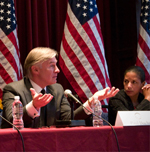A Conversation with Obama’s Foreign Policy Team
The Obama campaign is doing things a little bit differently. That’s been acknowledged over and over again. But one of those differences was a forum at the University of Pennsylvania on Thursday, April 3, with Obama’s top foreign policy advisers.
Richard Danzig, the 71st Secretary of the Navy, Susan Rice, the former Assistant Secretary of State for African Affairs, Paul Bucha, the former president of the Congressional Medal of Honor Society, and Denis McDonough, the Obama National Foreign Policy Director spent two hours taking questions on foreign policy issues ranging from Pakistan to Colombia and Israel to Africa.
The event was open to the public.
The conversation started with the Israel and Palestine question, to which McDonough and Danzig replied that America’s interest lies in two stable states, side-by-side. Danzig also noted that the role of America is to encourage and support, but not to enforce a decision, which should come from both sides. (Talks are currently underway between Olmert and Abbas to come to just such a decision.) He also noted that in 2006, Senator Obama visited Ramallah, the Palestinian capital, and spoke with students in a similar forum to the one Danzig was currently in.
When asked about the “mutually beneficial” economic relations with China, Dr. Rice (not to be confused with Condoleezza) said that she and Obama do not believe that economic relations should preclude the U.S. from speaking out against human rights violations. As the advisers did many times over the course of the forum, she stressed the need for a “multifaceted, complex approach” to international relations, condemning the Bush administration’s “with us or against us” philosophy.
Bucha agreed, saying, “You can’t be silent because you want to try to sell them something.”
Rice went on, in the context of discussing disease in Africa, to state that the central foreign policy insight of an Obama administration would be that “Our national security depends inextricably on the security and well-being of people all over the world.”
She continued, “Humanitarian interests are part of our national security interests.”
The Iraq war, a centerpiece of Obama’s campaign, was of course discussed. The advisers said that their position was to withdraw troops at a rate of one to two combat brigades a month, depending on circumstances, which would have almost all troops out in 16 months, leaving behind a small security force to protect embassies and provide training.
Bucha noted that the troops are “holding the economy over there together with duct tape and baling wire,” and that we cannot maintain that situation for much longer. The war is a drain on our economy, he said, a “massive cancer.”
An interesting question, in light of the recent news of Clinton adviser Mark Penn stepping down due to a conflict of interest over the Colombia free trade pact, was raised on Obama’s position on the agreement, which may come before Congress this week. Like Clinton, Obama opposes the agreement, and an audience member wanted to know why.
Colombia is already the third-largest recipient of American foreign aid (mostly due to the War on Drugs), and though the advisers noted that Obama wants to support trade with Colombia, he wants binding labor and environmental regulations, and more progress made on quelling the violence committed against labor leaders in that country.
Bucha again stressed, in relation to Russia and other European countries, that to succeed, not to win, is the important part. Obama doesn’t see things as binary systems, he noted. It’s not about black or white, and one side doesn’t have to lose for the other to win. “It’s not a game, it’s an art,” he said.
One of the last questions was raised about Pakistan and Obama’s early statement that if bin Laden were found in Pakistan and the government there would not act, the U.S. would. Danzig noted that Obama was not criticized for what he said he would do, just for stating it openly and honestly to the American people, and Rice elaborated on the notion of international law, saying that it is something we willingly participate in, not something that is imposed on us, and that it will be on our side if we act in our own defense, not if we engage in wars of choice.
A medical student offered Rice his proposal for a Peace Corps-like volunteer program for young doctors and medical professionals, which she was happy to accept.
To sum up the talk, Bucha said, “We don’t have to be afraid to engage people as equals.” This was in the context of foreign relations and diplomacy, but it was also the attitude behind the event itself. Everyday people in America have valuable insights into foreign policy, and the fact that the Obama campaign is willing to open itself up to the debate is a 180-degree change from the reaction of the current administration to concerns of the people. (See what Dick Cheney thinks of public opinion.)
Foreign policy is one of the areas where the president has the most unchecked influence. Giving regular Americans a voice in the debate would be a welcome change. The other candidates should think about holding similar forums with their foreign policy teams.
 (From left to right, McDonough, Bucha, Rice and Danzig)
(From left to right, McDonough, Bucha, Rice and Danzig)
Photos by Inna Spivakova. Thanks!
Reader mail can go to sarah.jaffe-at-gmail.com. Please include “Political Buzz” in the subject line or it may go to junk mail!

